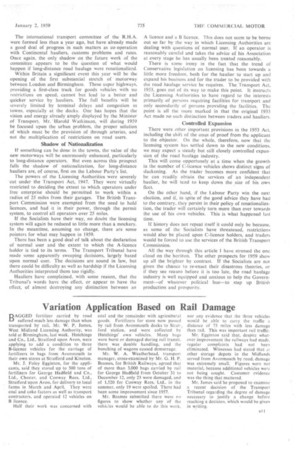Variation Application Based on Rail Damage
Page 45

If you've noticed an error in this article please click here to report it so we can fix it.
BAGGED fertilizer carried by road Li suffered much less damage than when transported by rail, Mr. W. P. James, West Midland Licensing Authority, was told at Birmingham, lasti week. Hutchings and Co„ Ltd., Stratford upon Avon, were applying to add a condition to three B-licence vehicles for the carriage of fertilizers in bags from Avonmouth to their own stores at Stratford and Kineton.
Mr. E Foley Egginton, for the applicants, said they stored up to 500 tons of fertilizers for George Hadfield and Co., Ltd., Chester, and Conway Rees, Ltd., Stratford upon Avon, for delivery to local farms in March and April. They were coal and coke factors as well as transport contractors, and operated 12 vehicles on B licence.
Half their work was concerned with caal and the remainder with agricultural goods. Fertilizers for store now passed by rail from Avonmouth docks to Stratford station, and were collected by Hutchings' own vehicles. Many bags were burst or damaged during rail transit. there was double handling, and the bunching of wagons caused demurrage.
Mr. W. A. Weatherheacl, transport manager, cross-examined by Mr. G. H. P. Beames, for British Railways, agreed that of more than 3,000 bags carried by rail for George Hadfield from October 3110 December 12, only 23 were damaged, and of 1,520 for Conway Rees: Ltd., in the summer, only 19 were spoiled. There had been some improvement since 1957.
Mr. Beames submitted there were no figures to show whether any of the vehicles would be able to do this work.
nor any evidence -that the three vehicles would be able to carry the traffic a distance of 75 miles with less damage than rail. This was important rail traffic.
Mr. Eguinton said that, despite whatever improvement the railways had made, regular complaints had not been eliminated. Witnesses had stated that at other storage depots in the Midlands served from Avonmouth by road, damage was extremely small. Figures were not material, because additional vehicles were not being sought. Customer evidence was the thing that mattered.
Mr. James said he proposed to examine a recent decision of the Transport Tribunal regarding the degree of damage necessary to justify a change before reaching a decision. which would be given in writing.




































































































